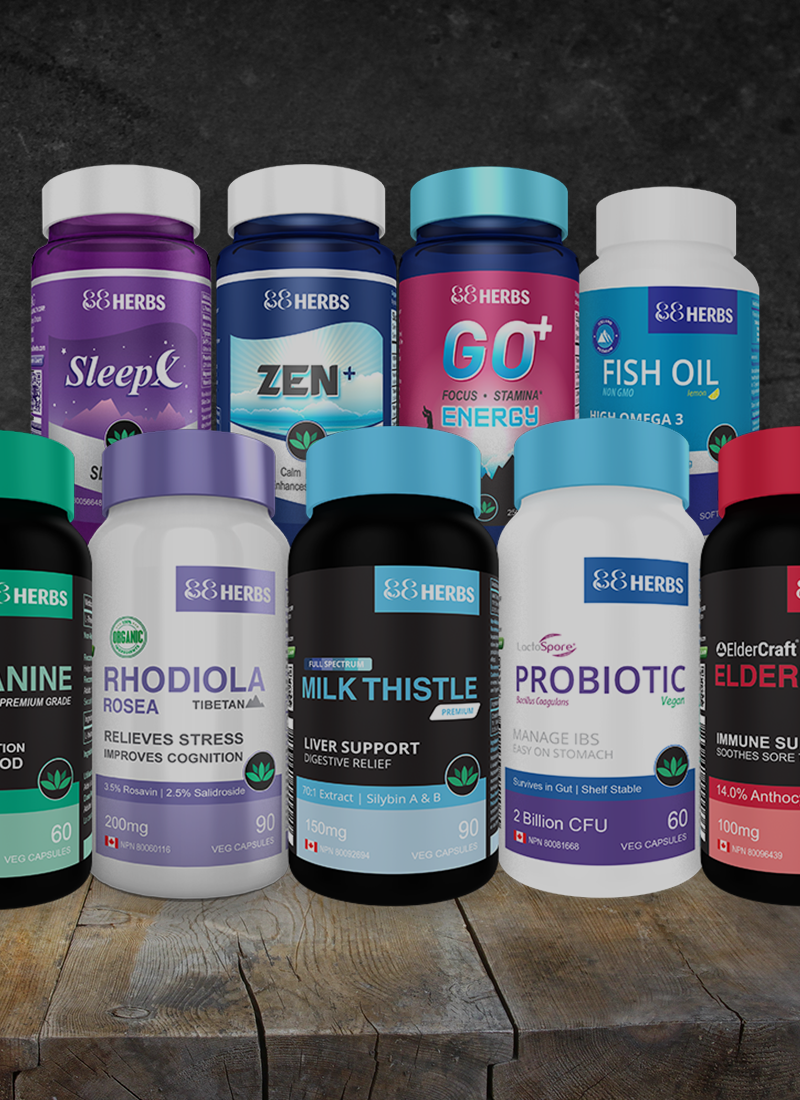Zinc Bisglycinate
What is Zinc bisglycinate?
Zinc bisglycinate is one zinc atom combined with 2 molecules of the amino acid glycine. It is one particular form of supplemental zinc. Zinc bisglycinate has been shown to be superior to other forms of zinc supplements because it is more bioavailable (absorbs better) and is far easier on the stomach and GI tract.
What is the difference between zinc bisglycinate and zinc glycinate?
Let’s clear up something important: Zinc bisglycinate and zinc glycinate are 2 names for the same thing.
Zinc bisglycinate is one zinc atom attached to two glycine molecules.
“Bis” means 2, referring to the 2 glycine molecules, so we prefer to use the name bisglycinate for clarity.
Zinc – A quick overview
Any zinc supplement is never “pure zinc”. It can’t be. The zinc atom (Zn 2+) on its own is a highly reactive metal. Therefore, zinc is always bound to other atoms to form one of the many types of zinc supplements you see in the market. These forms are all very different. You need to understand exactly which form you should use and why. Let’s dig deeper.
Why is Zinc Bisglycinate often considered the best form?
There are 2 main reasons for this:
One major reason is the high bioavailability, a fancy word for “absorption”.
Most forms of zinc absorb very poorly into the body.
Zinc bislycinate absorbs better than all other forms of zinc. Zinc gluconate, for example, the most common form of supplemental zinc, absorbs far less effectively than zinc bisglycinate.
Here is a study showing that zinc bisglycinate absorption is 43.4% better than zinc gluconate. The study also points out that zinc bisglycinate is very well tolerated (doesn’t cause stomach upset or other problems).
In another study measuring absorption 30 healthy females were randomly assigned to take zinc bisglycinate (60 mg of elemental zinc), zinc gluconate (60 mg of elemental zinc), or a placebo.
The researchers measured the levels of zinc in the blood, as well as a marker for zinc-induced copper deficiency. They found that all the women who took zinc bisglycinate had significantly increased levels of zinc in their blood, while those who took zinc gluconate or placebo did not show a significant change. Also, none of the supplements lowered the amount of copper in the blood (which can be a concern with zinc supplements, especially at relatively high doses). Overall, this study shows that zinc bisglycinate was far more effective at increasing zinc levels in the blood than zinc gluconate.
In a third study 12 healthy women were given zinc bisglycinate, zinc picolinate, zinc gluconate, or zinc oxide. The researchers found that the women who took zinc bisglycinate had the highest levels of zinc in their blood. They also measured the levels of zinc in the red blood cells over the same period of time period. They found that the women who took zinc bisglycinate had the highest levels of zinc in their red blood cells. In order of bioavailability, the results showed zinc bisglycinate > zinc picolinate > zinc gluconate > zinc oxide.
The second reason for the superiority of zinc bisglycinate is that it is far easier on the stomach than other forms of zinc.
So not only do these other forms of zinc supplements absorb poorly, which makes them ineffective, they also cause stomach upset and nausea. Read our article here to find out why zinc bisglycinate is the best form for avoiding nausea.
Since zinc bisglycinate absorbs better than other forms of zinc, and it also causes less side effects like nausea, we would expect to see real-life benefits from choosing zinc bisglycinate.
Here is a double-blind, placebo-controlled study that illustrates this:
42 aerobically fit women aged 18 to 30 participated.
The researchers tested aerobic fitness before and after one month of three test protocols:
Protocol 1: 36 mg of iron (as ferrous sulfate), 15 mg zinc (as zinc gluconate), 2 mg copper (as copper gluconate), 2 grams of carnitine, and 400 mg of phosphatidylserine
Protocol 2: 36 mg iron (as iron bisglycinate), 15 mg of zinc (as zinc bisglycinate), 2 mg copper (as copper bisglycinate), 2 grams of carnitine, and 400 mg of phosphatidylserine
Protocol 3: placebo corn starch.
Note: The only differences between the supplements in groups 1 and 2 were the differences in mineral forms. Group 2 took all mineral chelates in the bisglycinate form.
After one month, the women who took bisglycinate chelate minerals, including zinc bisglycinate, showed both significantly lower 3-mile run times, and significantly further stationary bike distance (over 25 minutes) compared to both baseline (before supplementation) and the other two groups.
Benefits of zinc bislgycinate:
- Reversing zinc deficiency
- Helping to improve white blood cell count
- Helping to improve immune system
- Helping with testosterone production in males
- Helping with wound healing and keeping skin healthy
- Helping with eye health, taste, and smell
- Helping with sleep
Note: We also have a magnesium bisglycinate supplement that is non-buffered with no fillers. It is the purest form we have seen on the market.
What is “buffered” vs “non buffered” zinc bisglycinate?
“Buffered” means that some other form of zinc has been mixed together. (You don’t want this)
Non buffered zinc bisglycinate, means that zinc bisglycinate is the only source of zinc in the product, and that no other inferior forms of zinc have been added in.
Buffering is a huge problem with magnesium, for example, because a lot of companies will call a product “magnesium bisglycinate” but it is actually a buffered form of magnesium bisglycinate mixed with magnesium oxide.
This same potential for companies to buffer their zinc bisglycinate unfortunately also exists.
We make sure to sell 100% non-buffered zinc bisglycinate, and we put this information on the label so that our customers know what they are getting.
What is “elemental” zinc?
This is an extremely important question to understand. We also have a useful article to help you understand elemental magnesium and why that is so important.
Simply put, elemental zinc refers to only the mass of the zinc atoms in a compound. The amount of elemental zinc in a supplement is the number of milligrams the zinc atoms weigh in a zinc compound. It is the actual weight of the zinc atoms themselves.
Remember, supplemental zinc is never 100% zinc because that would be a metal. Zinc supplements are always together in some molecular compound. Eg. zinc oxide, zinc citrate, zinc picolinate, zinc orotate, zinc gluconate, zinc acetate, zinc sulphate, and zinc bisglycinate (glycinate).
In order to calculate the amount of elemental zinc in a zinc supplement, we need to go back to early basic high school chemistry for a second – Let’s use the example of zinc oxide because of its simplicity.
This is one zinc atom bound together with one oxygen atom. It is “ZnO”. An oxygen atom has a molar mass of 16, and a zinc atom has a molar mass of 65. The entire molecule has a molar mass of 81 (16 + 65).
So in one molecule of zinc oxide, we have 16/81 or approximately 20% oxygen, and 24/81 or approximately 80% zinc.
So 100 mg of pure zinc oxide has approximately 80 mg of “elemental” zinc.
As a side note, it also has 20 mg of “elemental oxygen”, but we don’t care much about the amount of oxygen we’re getting from this molecule.
So again, the elemental zinc is the mass of the “pure” zinc inside a molecule, once we strip away the rest of the molecule.
Zinc bisglycinate is a more complex molecule, but the same logic applies. If you look at the entire molecule and do some simple math, you will see that the zinc portion of the molecule is only about 30% “elemental” zinc. The rest of the molecule is the weight of the glycine.
(In the real world, when you get pure non-buffered zinc bisglycinate, the elemental zinc is approximately 25%, not 30%. 30% refers to only the theoretical amount of zinc)
That means you need 100 mg of pure (non-buffered) zinc bisglycinate to obtain approximately 25 mg of elemental zinc.
Note: Even though the % of elemental zinc is much higher in zinc oxide, and in several other forms of zinc, the absorption rates and the overall effects on the body make non-buffered zinc bisglycinate a far superior supplemental form in most cases.
What is “chelated” zinc bisglycinate?
Zinc bisglycinate is often called “zinc bisglycinate chelate”. This is the full name. Zinc bisglycinate is a “chelated” form of zinc. “Chelated” forms of a mineral mean that an amino acid has been attached to them. In the case of zinc bisglycinate, 2 glycine molecules have been attached to a zinc atom.
Whether you hear “zinc bisglycinate” or “zinc bisglycinate chelate”, don’t be confused, they are the same thing. As noted above, “zinc bisglycinate” and “zinc glycinate” are the same thing as well.
When shopping around, it is essential to make sure you are getting “non-buffered” zinc bisglycinate. Remember that term.
What is the best dosage to take?
This is an important question. It depends on the type of zinc supplement, your age, and sex.
The National Institutes of Health (NIH) lists the following daily upper limits (UL) of supplemental zinc. Here you can find the recommended amounts of zinc for more information.
Daily Upper Limits for oral zinc supplements UL
| Age | Male | Female | Pregnant | Lactating |
| 0–6 months | 4 mg | 4 mg | ||
| 7–12 months | 5 mg | 5 mg | ||
| 1–3 years | 7 mg | 7 mg | ||
| 4–8 years | 12 mg | 12 mg | ||
| 9–13 years | 23 mg | 23 mg | ||
| 14–18 years | 34 mg | 34 mg | 34 mg | 34 mg |
| 19+ years | 40 mg | 40 mg | 40 mg | 40 mg |
Here is the table for the NIH Recommended Daily Amount of supplemental oral zinc.
RDA
| Age | Male | Female | Pregnancy | Lactation |
| 0–6 months | 2 mg* | 2 mg* | ||
| 7–12 months | 3 mg | 3 mg | ||
| 1–3 years | 3 mg | 3 mg | ||
| 4–8 years | 5 mg | 5 mg | ||
| 9–13 years | 8 mg | 8 mg | ||
| 14–18 years | 11 mg | 9 mg | 12 mg | 13 mg |
| 19+ years | 11 mg | 8 mg | 11 mg | 12 mg |
One problem with the recommended dosages for zinc supplements is that the form of zinc is rarely mentioned. Since various forms of zinc supplements absorb at different percentages, this is quite concerning. The amount of elemental zinc that actually absorbs into the body is what is important, not just the amount of elemental zinc inside a capsule.
What are the side effects of zinc bisglycinate?
Zinc bisglycinate has far fewer side effects than any other type of supplemental zinc on the market. Read here about why it is the best form of zinc to avoid nausea. Zinc is also considered relatively non-toxic, especially taken orally.
Having said that, you still need to be careful with all forms of zinc. If you take too much zinc (in any form), you can experience zinc toxicity.
Excessive zinc intakes are in the range of 100 to 300 mg of elemental zinc per day. This range far exceeds the recommended dose of zinc (above)
The symptoms of zinc toxicity are:
- Nausea
- Vomiting
- Epigastric pain
- Lethargy
- Fatigue
Another issue with too much zinc is copper deficiency. If you take too much zinc, you start to lose the copper in your body. Copper is another essential trace mineral. This can happen before you get to the zinc toxicity range.
Remember to always be careful with your zinc intake, and take zinc as recommended by your healthcare provider. Also pay close attention to the Upper Limit (UL), for daily zinc intake, which is listed above.
Zinc Q/A
Can I take zinc every day?
The short answer is yes. You can safely take zinc supplements every day. You already get some zinc every day, through your diet. It is essential to make sure you are not taking too much zinc though, as that can cause zinc toxicity. Please refer to the section above on zinc dosing.
Another thing to understand is that you don’t always need to take zinc every day, and more specifically, you don’t need to take the same amount of zinc every day.
You may choose to take more zinc daily for short periods of time, like when you feel a cold or flu coming on, if you feel a cold sore coming on, if you are over tired or over stressed, or if you feel weak and run down. Just make sure that you stay below the UL (Upper Limit) listed above, unless only for a short time, or you check with your healthcare provider for more information on your particular situation.
Is 50 mg of zinc too much?
A lot of people ask us if 50 mg of zinc is too much. 50 mg of zinc per day is above the UL (upper limit). We certainly wouldn’t recommend taking 50 mg of zinc every day, as this could lead to the potential serious side effects of zinc which are mentioned above.
Some supplement companies do offer zinc tablets or capsules which are 50 mg each. Some customers may feel they are getting a better deal, or a more powerful zinc supplement, so they may choose to get these for this reason. We would highly recommend that you be careful if you purchase these. It is larger than a safe daily dose for long term use.
With that said, there are some studies where zinc is safely taken at higher doses than 50 mg per day, but these studies are purposely short in duration, and are not meant to be continued every day for the rest of your life.
This is a major reason we offer our zinc in 25 mg per capsule. It provides our customers with more flexibility. If they really need to get 50 mg of zinc for a short time, they can take 2 capsules. If they prefer to take zinc daily, then our capsules are already made within a safe dose for long term use for both men and women.
Does zinc increase testosterone in females?
No, is the short answer. This is not something women need to worry about. A lot of men take zinc supplements, because they know it can increase their testosterone levels.
Women are understandably wondering, will zinc increase their testosterone levels too?
Male and female bodies are different. Taking zinc isn’t at all like taking anabolic steroids’. It is not like putting pure testosterone into your body. Zinc is more like a building block. If you are male and have testicles, zinc will help you produce a healthy amount of testosterone, but if you are female, zinc will help your reproductive system in other ways. Here is an interesting study about how zinc benefits the female reproductive system.
If you are female, zinc will balance your reproductive hormones in a healthy way, not make you have higher than normal testosterone levels.
What time of day should I take zinc?
Personal preference is the main factor determining when you should take zinc. This basically means you can take zinc “whenever you want”.
There is some evidence that it may help you improve your sleep when you take it at night.
Some people would rather take zinc during the day, however, and that is totally fine. Your body will metabolize and utilize zinc the same way.
Should I take zinc with food or on an empty stomach?
In terms of increasing absorption, it is recommended that you take zinc either an hour before, or 2 hours after meals. This is because fiber and phytates in food inhibit the absorption of zinc. Taking it on an empty stomach will increase absorption.
There is a big caveat though, because zinc supplements, especially on an empty stomach, often make people experience nausea. In this case, you can take your zinc with food.
This is another major benefit of non-buffered zinc bisglycinate. It doesn’t cause nausea, and therefore you can take it much more easily on an empty stomach. If you prefer to take it with food, it will still absorb better than other forms of zinc.
Where to buy non buffered zinc bisglycinate?
Click here to buy our premium non buffered zinc bisglycinate. We have thousands of monthly loyal customers from all over the world who truly love the benefits they get from our high absorption zinc, and without the side effects.

Andrew Best
Cofounder - Director of R&D
Andrew educates consumers about the latest scientific research in the natural health supplement field.


